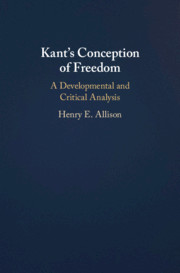Book contents
- Kant’s Conception of Freedom
- Kant’s Conception of Freedom
- Copyright page
- Dedication
- Contents
- Preface
- Acknowledgments
- Note on Sources and Key to Abbreviations and Translations
- 1 Kant’s Writings of the 1750s and the Place in Them of the Free Will Issue
- 2 Kant’s Theoretical Philosophy in the Early 1760s and Its Relation to His Conception of Freedom
- 3 Kant’s Moral Philosophy in the Early 1760s
- 4 Kant’s Dialogue with Rousseau Supplemented by His Dreams of a Spirit-Seer
- 5 From the “Great Light” to the “Silent Decade”: Kant’s Thoughts on Free Will 1769–1780
- 6 Kant’s Account of Free Will in the Critique of Pure Reason
- 7 From the Critique of Pure Reason to the Groundwork
- 8 The Fact of Reason and Freedom in the Critique of Practical Reason
- 9 The Critique of the Power of Judgment and the Transition from Nature to Freedom
- 10 Kant’s Final Thoughts on Free Will
- Bibliography
- Index
5 - From the “Great Light” to the “Silent Decade”: Kant’s Thoughts on Free Will 1769–1780
Published online by Cambridge University Press: 19 December 2019
- Kant’s Conception of Freedom
- Kant’s Conception of Freedom
- Copyright page
- Dedication
- Contents
- Preface
- Acknowledgments
- Note on Sources and Key to Abbreviations and Translations
- 1 Kant’s Writings of the 1750s and the Place in Them of the Free Will Issue
- 2 Kant’s Theoretical Philosophy in the Early 1760s and Its Relation to His Conception of Freedom
- 3 Kant’s Moral Philosophy in the Early 1760s
- 4 Kant’s Dialogue with Rousseau Supplemented by His Dreams of a Spirit-Seer
- 5 From the “Great Light” to the “Silent Decade”: Kant’s Thoughts on Free Will 1769–1780
- 6 Kant’s Account of Free Will in the Critique of Pure Reason
- 7 From the Critique of Pure Reason to the Groundwork
- 8 The Fact of Reason and Freedom in the Critique of Practical Reason
- 9 The Critique of the Power of Judgment and the Transition from Nature to Freedom
- 10 Kant’s Final Thoughts on Free Will
- Bibliography
- Index
Summary
During this extended period Kant published only one work of philosophical import: On Form and Principles of the Sensible and Intelligible World (1770) [De mundi sensibilis atque intelligibilis forma et principiis] (henceforth referred to as the Dissertation); and it does not contain a single direct reference to the free will problem. Nevertheless, it is evident from the transcripts of his lectures and the Reflexionen from this period that it was a time in which Kant paid considerable attention to this topic, as well as many others that became central to his later thought. Moreover, despite Kant’s silence on the topic in the Dissertation, which followed shortly after the epiphany of the “Great Light,” (1769), the main results of this work cannot be ignored here, since they played a decisive role in Kant’s subsequent treatment of the problem. The aim of this chapter is to trace the development of Kant’s thoughts on free will during this period and it is divided into four parts. The first considers the nature and significance of the “Great Light” and its bearing on the Dissertation; the second and lengthiest, largely (but not always) following the chronology adopted by Adickes, examines the accounts contained in Kant’s numerous Reflexionen from the period; while the third and fourth analyze his views expressed in his lectures on metaphysics and practical philosophy respectively,
- Type
- Chapter
- Information
- Kant's Conception of FreedomA Developmental and Critical Analysis, pp. 176 - 233Publisher: Cambridge University PressPrint publication year: 2020



